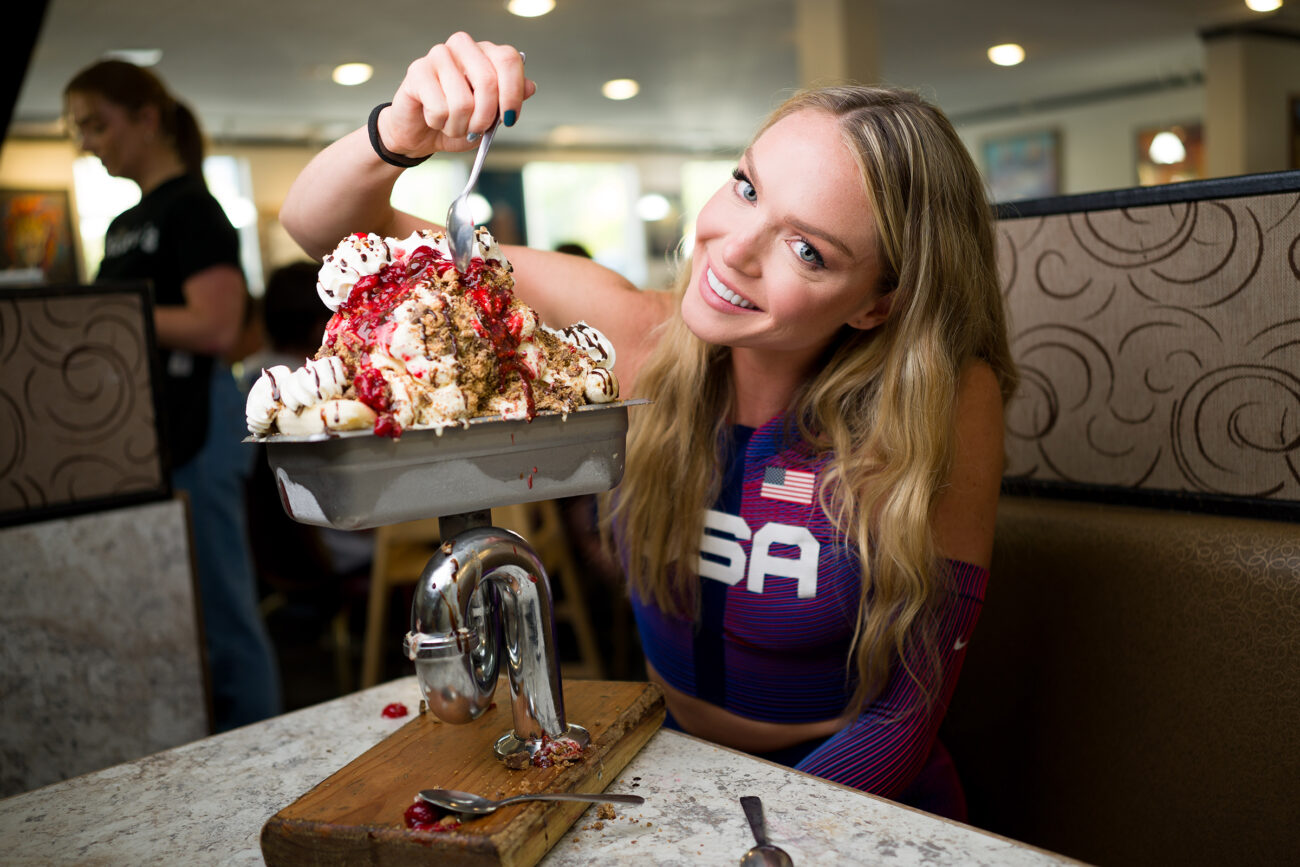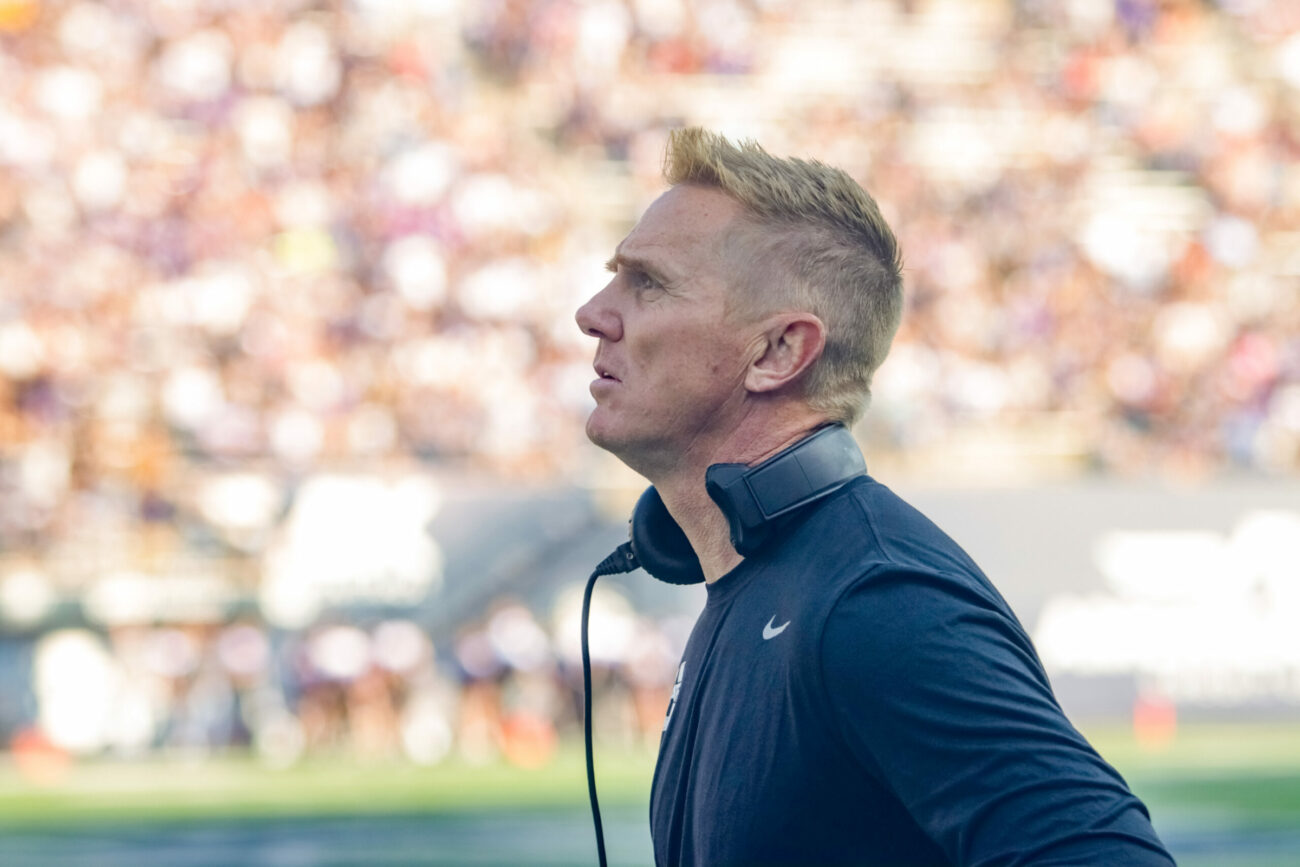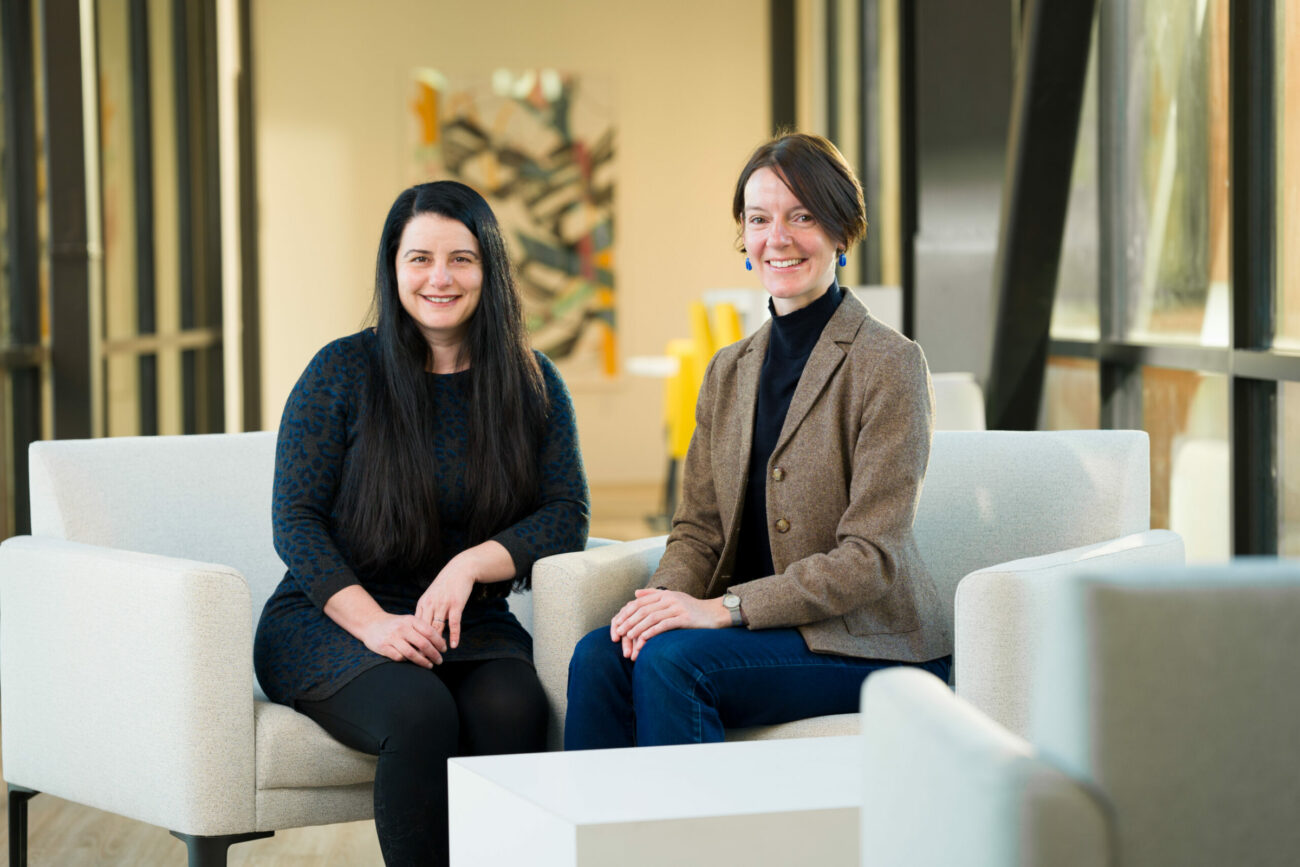Serving Those Who Have Served
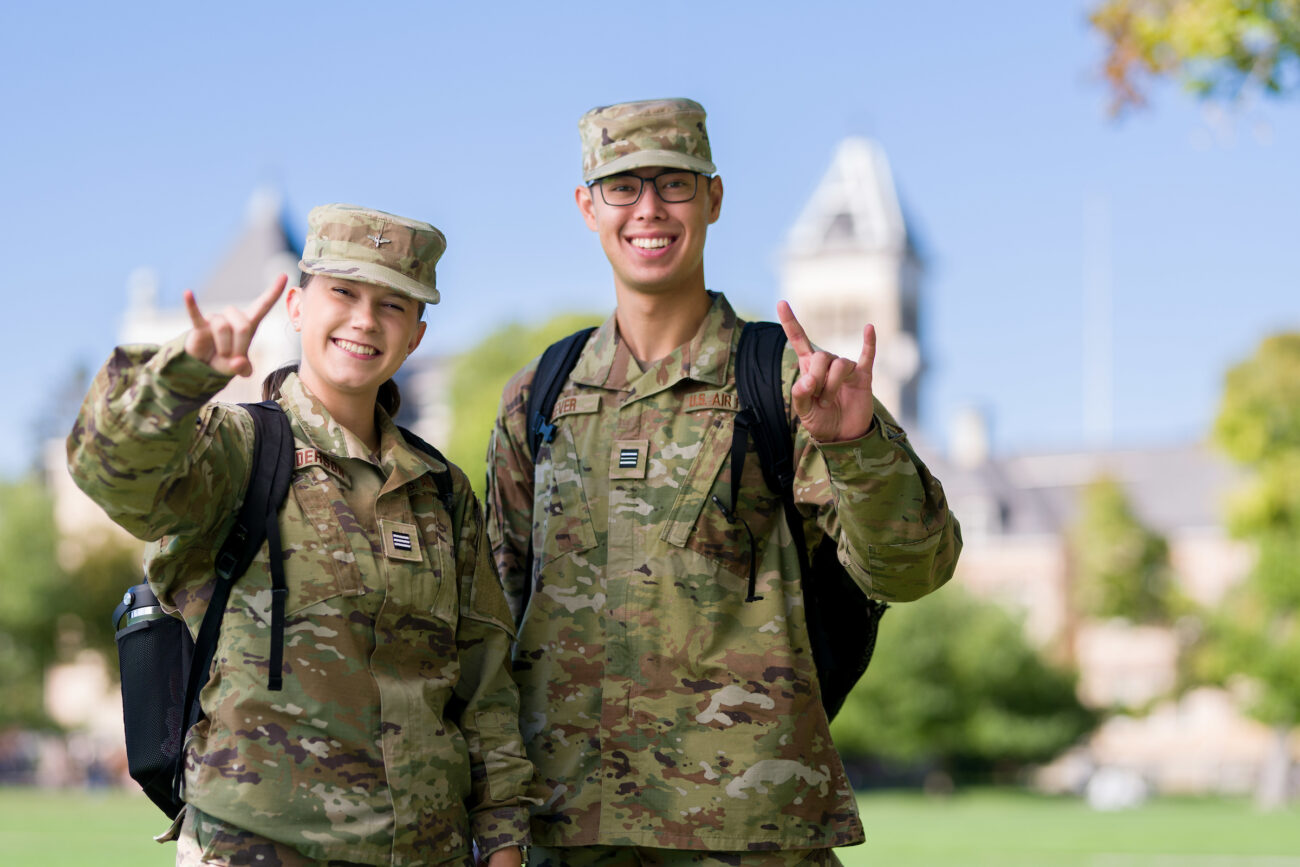
Many veterans are thriving at USU and so is the Veterans Resource Office under new director Andy Allen
By Jeff Hunter ’96
Being 7,000 miles away from home in a combat zone on Christmas isn’t easy. So, in a sincere gesture to provide a little holiday downtime for the enlisted men in their detachment, Andy Allen and some other officers stationed in Iraq volunteered to stand watch along the protective wall on Christmas morning 2004.
And despite the lack of snow, trees, and gifts, it was a morning the U.S. Army veteran will never forget thanks to a warmhearted moment in the middle of the violent struggle of Operation Iraqi Freedom.
From his post, Allen watched from about a hundred yards away as a mother and her two young children emerged from their small home with a soccer ball.
“They start kicking the ball around, and they look just like a typical American family that just wants to be happy,” Allen recalls. “And yet, they have all this crud going on around them with these horrible, horrific, terrorist-type of activities taking place in their homeland, to the point that they’re being intimidated out of fear not to support any of our efforts to help them become free.
“The campaign of the enemy was pervasive and so disruptive to a normal society, and yet, I’m there seeing what society should be like.”
Allen, who first joined the Army in 1991 just as Desert Storm was winding down, had been deployed long enough to realize that chaos had reigned in that part of the world so long, that by 2004, “they didn’t know what freedom was and what a society looks, smells, and tastes like on a daily basis.”
“That’s when I realized that’s what I was trying to do; that’s what we were trying to do,” Allen remembers. “We were searching for a way for that family, those little kids kicking the soccer ball around, to be free and stay free.”
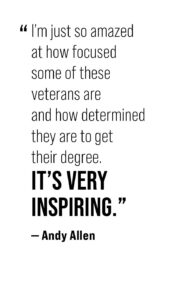
Creating a Hub for USU Veterans
Allen is the son of a Navy veteran who was given an aviator call sign by members of the Air Force during a quarter of a century of service in the U.S. Army. So, it goes without saying that the 57-year-old is comfortable with military culture and its unique experiences, which is beneficial when trying to understand and serve the needs of veterans attending school at Utah State University.
“There are so many ways that I connect with these individuals,” says Allen, who has served as the director of USU’s Veterans Resource Office since July 2022. “There are a lot of connections and touch points that we have in common, and I think it helps make them feel that they can relate to me and relate to the office.
Located on the east side of the Taggart Student Center, the VRO has long been the place on campus where military veterans and their dependents could come for aid and advice while navigating the complexities of GI Bill education benefits and to receive financial and academic support. This school year, Allen says there are about 350 veterans and 100 dependents of veterans at Utah State University, and he and the small staff in the VRO are working hard to welcome and interact with as many of them as possible, as often as possible.
“When I first got here last year, we had about 15 or 20 people come through our office in a week. This is how much that’s changed,” Allen says while pointing at some numbers written at the top of the whiteboard hanging in his office. “We had 93 people come through one day last week, with 375 people coming through for the week.
“We’ve changed the dynamic of the office and how it runs,” he adds. “It’s no longer just an office. It’s a hub.”
The walls of the VRO are bright white, and Allen says he’s tried to make the office warm and welcoming — somewhat like a USO lounge at an airport. In addition to spaces for studying and meeting with the VRO staff or tutors, there are new couches, big-screen TVs, and video-game consoles.
There’s also food. In addition to hosting the occasional meal, the office also has a refrigerator that is stocked with water, soda, juice, yogurt, cheese, applesauce, and other items, while snack foods like cookies, chips, candy, and granola bars are also available for free.
“Listen, we’re never going to ask anyone if they have enough food,” Allen explains. “But some of our veterans having been in some tricky situations, and we found out about one that was homeless. We don’t want them to feel like we’re getting into their business; we’re just going to feed you.
“And we’re going to show that kind of respect to you, so that we never have to ask that question so you can maintain your integrity. You can come in and grab something anytime you want to without ever asking us for anything.”
That’s part of what Allen says is his plan to create “a hub where people feel respected.”
“I don’t need to know anything about you,” he adds. “All I need to know is that you’re a veteran, or the dependent of a veteran.”
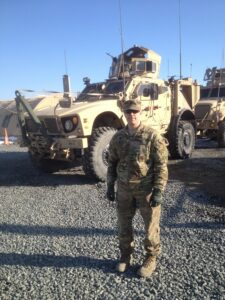
Allen, himself, is both a veteran and the dependent of a veteran. Born in Alaska, he grew up in the Puget Sound area of Washington state as the son of a 25-year veteran of the U.S. Navy’s Civil Engineering Corps. Allen says he grew up always planning to serve in the military, but ended up choosing the Army over the Navy because it came with the promise that if he became a certified Russian linguist, he would be guaranteed to serve as a linguist in the field.
Despite being married with children, Allen ended up joining the U.S. Army as a private in 1991, just as Operation Deseret Storm in Iraq and Kuwait was flooding the United States with a surge of patriotism.
“I knew that I needed to come in then and help defend our country,” Allen proclaims. “I’m very patriotic, and I always knew that I wanted to serve. So, I quit what I was doing, enlisted, and just waited to deploy.”
Although he didn’t go to Iraq in the early ‘90s, after being commissioned in 1995, Allen ended up going there as an officer a decade later as part of Operation Iraqi Freedom. During that period, he served in two Stryker Brigades in partnership with the Air Force, which is how he was tagged with the aviator call sign “Stryker.”
Allen was also deployed to Afghanistan in 2013-14 before retiring as a lieutenant colonel after 26 years in the Army at the end of 2016. Although he had planned to stay until reaching the 30-year mark, he says he kept having a “strong feeling” that he should retire earlier.
“I retired and my wife was diagnosed with Stage 4 pancreatic cancer a month later, so the timing was amazing,” he says. “I was interviewing for a position at Amazon to be their military recruiter in Seattle when I found out, so I just stopped and stayed home. I was so lucky to be home with my wife all day, every day until she passed away.”
Eventually, Allen met another woman online. And after things progressed, he ended up moving to Cache Valley, so he didn’t have to drive 12 hours for a date. After marrying Cathi, a senior business manager at USU’s Utah Water Research Laboratory, Allen also started seeking employment at Utah State and was blessed once again with “amazing” timing despite not getting the job he was actually interviewing for.
Man on a Mission
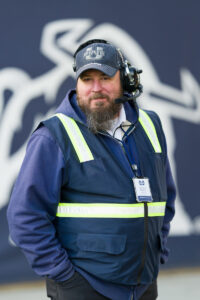
Anyone looking to cause trouble near the southwest tunnel of the Dee Glen Smith Spectrum during an Aggie basketball game should be aware that the man standing guard there is a little more hardened than he might appear.
“Most police officers at Utah State have told me that if I’m working, they know that I can handle the situation,” Dustin Moore says with a small chuckle. “And if I can’t handle the situation, they know they better get some help.”
A member of the USU Guest Services team, Moore also works Aggie football games and other events. But unlike most members of the crew, Moore boasts the unique experience of previously serving as a military policeman in the U.S. Army Reserves, and he’s seen some things, including some very difficult situations while on active duty in Iraq and Afghanistan.
But Moore still believes he can learn more. Which is why the 47-year-old has been attending Utah State, while also serving as the front desk lead at the University Inn and Conference Center, in addition to his position with Guest Services.
“I’ve been using my GI Bill,” notes Moore, who retired from active duty in 2018 after most recently serving as a human resources specialist in Los Angeles. “It took me a couple of years from the time that I retired to get accepted at Utah State after moving back to Utah, but the VRO helped me a lot, along with some professors and a member of the Board of Trustees.
“… I probably could have come back sooner had I wanted to do a non-disciplinary track. But if I was going to get a degree, I wanted it to be in something specific, not just a general degree. I don’t know why, but that makes a big difference to me.”
A native of Wellsville, Utah, Moore graduated from high school in 1994, then served a mission for The Church of Jesus Christ of Latter-day Saints. Moore says he always dreamed of being a policeman when he was a kid and he heard he could secure a better position with some military experience. So, he joined the Army National Guard in 1999 and then later transferred to Army Reserves.
“It was kind of ingrained in me,” says Moore, who has numerous family members who have served in the military. “I never had any doubt that I would serve the public in some way.”
Moore was working for the Jordan School District on Sept. 11, 2001, but his detachment in Salt Lake City wasn’t initially called up to go overseas. Instead, because of increased concerns about terrorism, it was placed on active duty to provide additional security at the 2002 Winter Olympics, which led to him working out of Fort Douglas that fall and winter and interacting with the U.S. Department of Justice, the Secret Service, and practically every police agency in the Salt Lake Valley.
“It was almost like a mini-deployment,” Moore says of his role at the Olympics.
About a year later, Moore was activated again to help provide training for Guard and Reserve soldiers being sent to Iraq and Afghanistan. And, after making occasional visits to those war zones from stateside locations in Colorado and Texas, he served full deployments in Iraq in 2006 and Afghanistan in 2010. Moore ended up completing his 17 years in the military serving in transportation and human resource roles.
But all along, he kept chipping away at a college degree, a process he first started at Utah State in 1997. He was a class away from an associate degree in criminal justice at Salt Lake City Community College before being called up, and has taken online courses at several other institutions through the years. But now that Moore’s retired from the military, he’s even more determined to complete a degree in technical management from the College of Agriculture and Applied Sciences.
He is taking both online courses and in-person classes, which means the father of six and grandfather of one finds himself sitting in class primarily amongst students in their late teens and early 20s. He says he is currently on track to graduate by 2025.
“Sitting in classes as a veteran is different, and being an older veteran like me makes it even more different,” Moore says. “So, I usually don’t speak up in classes as much as I should, but I want to hear the younger generation’s point of view on things and see where their mentality is. And so, I usually sit back and just observe.”
Where Moore does feel more comfortable, however, is the Veterans Resource Office, where he has spent significant time getting help from tutors, as well as visiting with other veterans.
“We have a lot of younger veterans now than we’ve had before,” Moore acknowledges. “But most of them are still older than most students, and they have a different level of maturity than the average 18-year-old.
“And having also been in the military helps. It’s easier to talk to people who have kind of done some of the same stuff that you’ve done and have been there and done that.”
USU’s Superstar Veterans
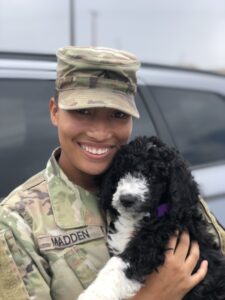
Markie Madden is a vet who would like to be a vet.
The 22-year-old from Pine Bluffs, Wyoming, enrolled at Utah State in August 2021 after spending two years in the U.S. Army. She says she always had her eye on joining the military because her grandfather was in the Air Force, but she chose the Army over other branches “because I don’t particularly like airplanes and I’m not a fan of water.”
“But I’m patriotic, and I wanted to serve and make friends,” Madden adds. “I was kind of shy going in, and I learned to express myself a little more.”
Originally hoping to end up as a working dog handler in a K-9 unit, Madden found there were a limited number of training spots available and spent the majority of her stint as an MP. She says she didn’t spend much time at the Veterans Resource Office last year because she was busy with work but has been coming more this fall because she enjoys getting to know other veterans and having a place to study in between classes.
“I like the sense of community,” Madden notes. “It’s easier for me to share with people here.”
Madden is currently taking courses geared towards someday becoming a veterinarian, but she is also contemplating returning to the Army in the future and working with animals in the service. In the meantime, she’s found a comfortable and familiar spot as a member of the USU Army ROTC.
“It’s been pretty good so far,” she says of the ROTC experience. “It’s a lot of things I already know.”
Another military veteran currently involved in the ROTC program is Tatum Nelson, a native of Brigham City, Utah, who spent three and a half years in the U.S. Air Force. Now 27 years old with a wife and baby daughter at home, Nelson joined the service at the age of 19 at the urging of his grandfather, a Vietnam War veteran who served with the U.S. Marines.
Nelson ended up in ground transportation in the Air Force, serving most of his time in Wyoming, other than a six-month deployment to Qatar. But after leaving the Air Force, He returned home and joined the Air National Guard, then the National Guard, and is now an ROTC cadet at Utah State.
“I obviously can’t get enough military,” says Nelson, who is a history major with an emphasis on military history.
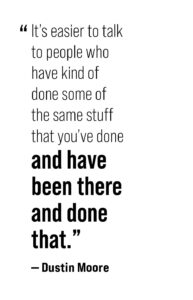
He also made a little history himself last February when he was elected the first president of the re-established USUSA Student Veterans of America club. The group, which had gone dormant for a while, was brought back in January 2022 to increase camaraderie amongst USU’s veterans.
“There were a lot of us hanging out after class and everything anyways, so starting the USUSA Student Veterans of America organization was a pretty natural thing,” Nelson explains. “The official title makes it seem like less of just a group of friends hanging out, and the formalization allows us to provide a better framework for a network. Because now we can establish official connections to resources for veterans who might have been maybe scared to reach out or may have not even known they were there.”
He points out that while he’s from the area and is married with a child, many of the veterans at the university have much less of a support system. And they’re also often accustomed to being stationed far from their family and friends for long periods of time, “so, the guys that you work with are all you have, and then you no longer have that support network.”
“And they might be dealing with a lot, including combat trauma,” Nelson continues. “So, they end up just sitting at home, stressed out about classes. And that makes it easy to get into that downward spiral where they start blowing off school because you’ve got no one to just vent to.”
Since starting off with just four students, the USUSA Student Veterans of America club has grown rapidly, with students gathering for events like pancake breakfasts, game nights, movie nights, trips to shooting ranges, and gatherings for special events like the Super Bowl or World Cup soccer matches.
Nelson says overall, the Veterans Resource Office he’s experienced is “pretty impressive.”
“From what I’ve heard, it wasn’t really like that,” he says. “(Allen) has really changed a lot of the old vibe. He’s done a lot.”
For his part, Allen wasn’t actually seeking a position working with veterans. But after coming up short in the interview process for another job at USU, a member of the search committee later let him know via email that the VRO was in search of a director.
The timing and the position were perfect.
“We’ve got some superstar veterans here,” Allen proclaims. “I’ve been so impressed. They’re so focused on their education and coming in here and utilizing our tutors and studying during the day and deep into the night.”
Allen says the doors of the VRO are open daily from 8 a.m. to 5 p.m., but that anyone who is inside the office at 5 p.m. is welcome to stay there for as long as they desire.
“We’ve gotten reports from the cleaning team that veterans are still in here studying at midnight, 1 a.m. and 2 a.m.,” he says. “But we’ve worked with the people over at the TSC, which usually shuts down at 10 p.m., not to kick them out when they close the building down because they’re studying.
“I’m just so amazed at how focused some of these veterans are and how determined they are to get their degree. It’s very inspiring.”



